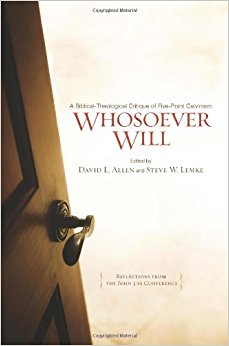By: Brian Chilton | October 10, 2017
Allen, David L., and Steve W. Lemke, eds. Whosoever Will: A Biblical Critique of Five-Point Calvinism. Reflections from the John 3:16 Conference. Nashville: B&H Academic, 2010. $24.99. 306 pages.
Views on God’s sovereignty and its correlation with human freedom vary greatly among Evangelical Christians. Calvinists, Arminians, Thomists, Molinists, and Wesleyans are among the better-known viewpoints in this area. Baptists who do not consider themselves Calvinists nor Arminians have often been stuck in theological limbo without a name to call themselves. Those who attended the John 3:16 conference gave this group of believers an identity: Traditional Baptists. But, what do Traditional Baptists believe? That is what Allen and Lemke’s book Whosoever Will answers.
Summary of Whosoever Will
Whosoever Will is a collaborative book which features articles from various proponents of Traditional Baptist theology. The book is divided into two sections. In the first section, Jerry Vines offers a thrilling and inspirational message on John 3:16 in the first chapter of the book. Paige Patterson describes the issue of total depravity from a Traditional Baptist perspective, arguing that one’s depraved nature does not eliminate the ability to respond to God’s grace. In what is in my estimation one of the best chapters of the book, Richard Land offers a congruent stance on God’s “eternal now” perspective when covering the issue of election. David Allen discusses how the atoning work of Christ is sufficient to save all mankind, but efficient to save those who respond to God’s grace. Steve Lemke offers a critique on the Calvinist doctrine of irresistible grace, successfully (in my opinion) the belief that people have the innate ability to respond or resist the Holy Spirit.[1] Kenneth Keathley argues that the Scripture, in contrast to pure Arminianism, defends the idea of the believer’s assurance, which is better than Calvin’s perseverance of the saints.
In the second section, church and ministerial matters are considered. Kevin Kennedy argues that Calvin was not as much of a Calvinist as one finds in the Synod of Dort as it relates to the extent of Christ’s atonement. Malcolm Yarnell, III discusses the impact that hyper-Calvinist ideologies hold on Baptist churches, especially in the area of evangelism and antinomianism. R. Alan Street discusses the dismissal of the public invitation by some hyper-Calvinists, while illustrating the importance of an altar call. Jeremy Evans provides his reflections on determinism and human freedom. Evans discusses the aseity of God and the differences between ontological aseity and psychological aseity (very good chapter). Finally, Bruce Little argues that Calvinism, even as found in John Piper and Gordon Clark’s theology, holds a holy God responsible for all evil deeds (extremely good chapter!).
Strengths/Weaknesses
The book does a fantastic job defending the Traditional Baptist viewpoint. Each author illustrates the problems that are found in some Calvinist notions of God and human freedom. The book allows even the layman a good understanding of the issues involved in this heated debate. In my estimation, the book succeeds at what it sets out to do.
The only major weaknesses that one might find in this book is the same weakness that needs to be treated in Traditional Baptist theology. Someone needs to write out a systematized theology of Traditional Baptist theology. I have long thought that Traditional Baptist theology fits the model of the Congruist strain of Molinism.[2] This book seems to support the notion, but never really comes out to claim that Molinism is an appropriate biblical stance, although it is implicitly hinted.
Benefits
The book provides three benefits. First, the book is fairly easy to read, although some articles are more complex than others. The book’s readability allows most anyone who is interested in Traditional Baptist theology a greater glimpse at the issue. Second, the book offers a compelling case for Traditional Baptist theology. While not everyone will be convinced after reading the book, the authors provide the reader food for thought. Third, the book will whet one’s appetite for deeper theological issues.
Rating
Undoubtedly, some articles in the book are better than others, yet I believe the book succeeds at what it sets out to do. While not every article may be deserving of this rating, all-in-all, I give the book 5 stars. I think it the book is an important addition to the current modern theological discussion and I highly recommend it to both Calvinist and non-Calvinist readers.
 Brian Chilton is the founder of BellatorChristi.com and is the host of The Bellator Christi Podcast. He received his Master of Divinity in Theology from Liberty University (with high distinction); his Bachelor of Science in Religio
Brian Chilton is the founder of BellatorChristi.com and is the host of The Bellator Christi Podcast. He received his Master of Divinity in Theology from Liberty University (with high distinction); his Bachelor of Science in Religio us Studies and Philosophy from Gardner-Webb University (with honors); and received certification in Christian Apologetics from Biola University. Brian is currently a student of the Ph.D. program in Theology and Apologetics at Liberty University. Brian is full member of the International Society of Christian Apologetics and the Christian Apologetics Alliance. Brian has been in the ministry for over 14 years and serves as the pastor of Huntsville Baptist Church in Yadkinville, North Carolina.
us Studies and Philosophy from Gardner-Webb University (with honors); and received certification in Christian Apologetics from Biola University. Brian is currently a student of the Ph.D. program in Theology and Apologetics at Liberty University. Brian is full member of the International Society of Christian Apologetics and the Christian Apologetics Alliance. Brian has been in the ministry for over 14 years and serves as the pastor of Huntsville Baptist Church in Yadkinville, North Carolina.
© 2017. BellatorChristi.com.
[1] Lemke argues that Proverbs 1, the Prophets and Psalms (especially Ps. 78:1; Ps. 81:11-13; and Jer. 32:33), Stephen’s sermon in Acts 7, Paul’s salvific experience, and Jesus’s teachings all espouse that God’s grace is resistable.
[2] For simplicity’s sake, let’s just call the model Molinism.





